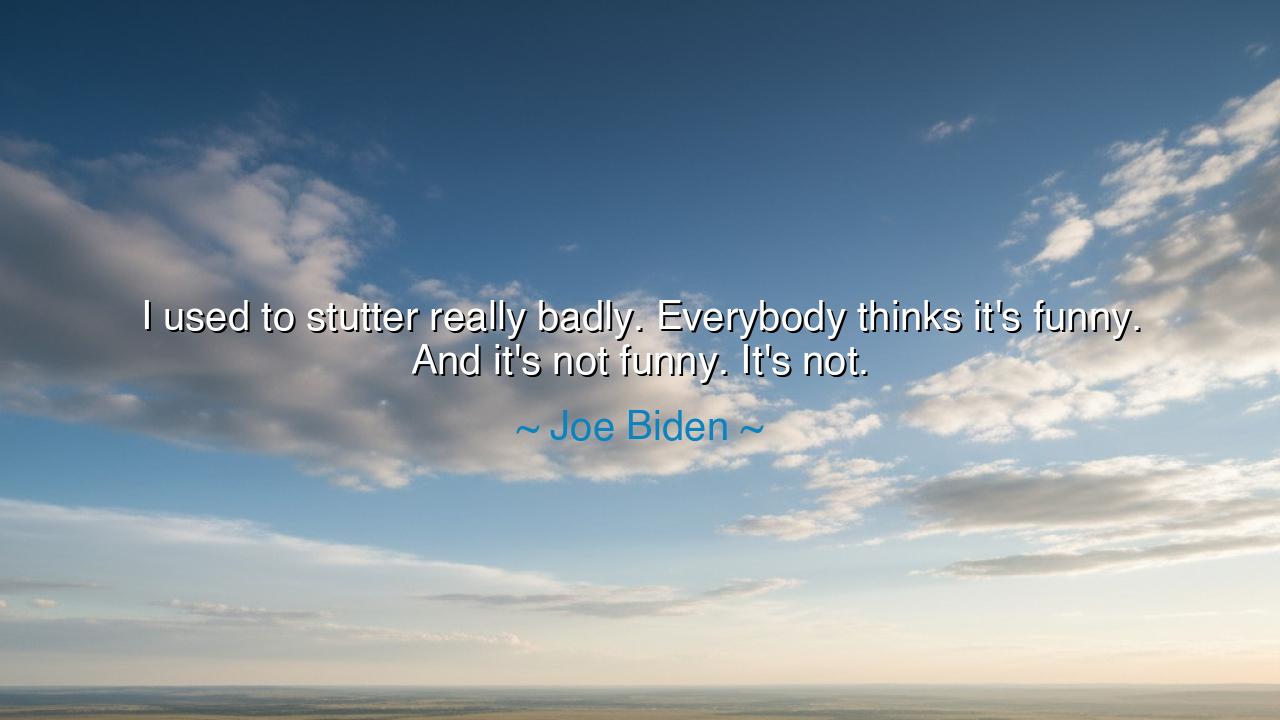
I used to stutter really badly. Everybody thinks it's funny. And
I used to stutter really badly. Everybody thinks it's funny. And it's not funny. It's not.






“I used to stutter really badly. Everybody thinks it’s funny. And it’s not funny. It’s not.” — thus spoke Joe Biden, a man who has walked the long road from mockery to mastery, from the trembling voice of childhood to the commanding speech of leadership. In these few words lies a truth both painful and noble — that suffering, when endured with courage, becomes the forge of strength, and that the laughter of others can be transformed into the echo of victory. His statement, simple and unadorned, carries the weight of a thousand unheard voices — the voices of those who struggle not to be perfect, but merely to be understood.
When Biden says, “Everybody thinks it’s funny. And it’s not funny,” he is not merely recalling his own humiliation; he is exposing the cruelty that ignorance often carries in its jest. The ancients knew this cruelty well. In the marketplaces of old, the weak, the crippled, and the outcast were the butt of laughter — for mockery, to the unwise, was a kind of entertainment. Yet the philosophers, men like Epictetus, who was himself a slave and lame of leg, taught otherwise: that what the ignorant mock, the wise endure; that the measure of a soul is not in how it laughs, but in what it chooses to laugh at. The mockery that once silenced the stutterer becomes, in the end, a mirror of the mocker’s own poverty of heart.
The young Biden, by his own account, faced the merciless world of childhood ridicule. His stutter was not a quirk of speech, but a storm within his own body — a battle between thought and breath, between will and voice. The ancients would have called such a struggle a test of the spirit, for in learning to master the self, one becomes greater than circumstance. He practiced before a mirror, reciting poetry to steady his tongue. Like an orator of old — like Demosthenes, who filled his mouth with pebbles and spoke over the roar of the sea to conquer his stammer — Biden turned hardship into discipline. What others mocked as weakness became the crucible in which perseverance was born.
And so, when he says, “It’s not funny,” he speaks not with bitterness, but with truth. He knows that behind every struggle that draws laughter lies pain unseen by the crowd. The ancients taught that the heart is the first battlefield of the hero. To mock another’s trial is to fail to see the sacred fire that lies beneath it. The stutterer, the outcast, the broken one — each carries a story that, if endured, can teach the world what true courage is. For courage is not the absence of fear or flaw, but the resolve to rise despite them, again and again.
Biden’s journey from a boy who could barely speak to a man who would one day address nations is a parable for all generations. It teaches that vulnerability can become power, that the very thing we most wish to hide can become the source of our greatest strength. The ancients would have seen in him the archetype of the wounded warrior, the one who transforms pain into wisdom. His voice — once hesitant, now steady — is not merely his own; it carries the echoes of every soul who has fought to be heard in a world too quick to mock, too slow to understand.
There is also a deeper moral hidden in this quote, one that speaks to our times as much as to his: that empathy is the highest form of intelligence. To laugh at another’s flaw is easy; to imagine their struggle is divine. The Greeks called this phronesis — moral wisdom, the understanding of what it means to live rightly. Biden’s words, though simple, are a rebuke to a culture that often prizes mockery over meaning. He reminds us that every person we meet is carrying a battle we cannot see, and that laughter, when used carelessly, can wound more deeply than words of hatred.
So let this teaching be carried forward: Do not mock the weakness of another, for what you scorn today may tomorrow be your own trial. Instead, cultivate compassion — for compassion is the bridge between souls. When you see someone stumble, help them stand. When you hear someone struggle to speak, listen with patience. Remember that the greatest voices of history often began as whispers, trembling and uncertain. And if you yourself are mocked, take heart — for every wound, if borne with dignity, becomes a mark of strength. As Joe Biden reminds us, what is not funny may, in time, become sacred — the sound of a voice that refused to be silenced, rising through laughter to truth.






AAdministratorAdministrator
Welcome, honored guests. Please leave a comment, we will respond soon